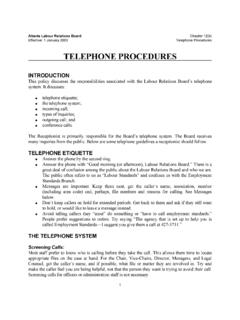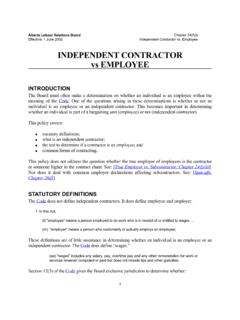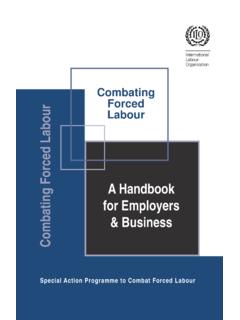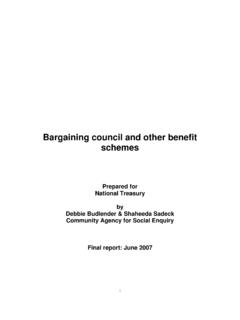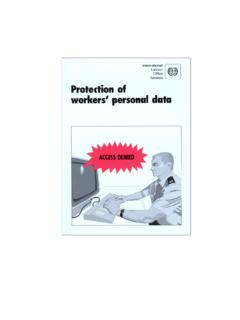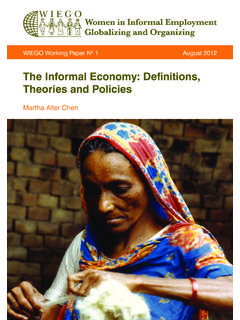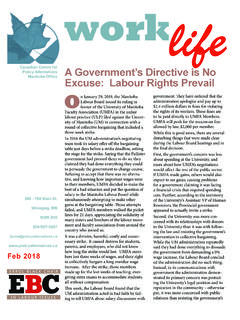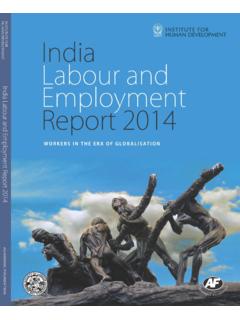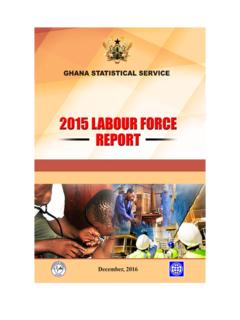Transcription of Copies of the - Alberta Labour Relations Board
1 Copies of the Labour Relations code , the Public Service Employee Relations Act, and the Police Officers Bargaining Act are available for viewing or printing on the Board s website at or by contacting the Queen s Printer at: Queen s Printer Bookstore 5th Floor, Park Plaza Building 10611 - 98 Ave Edmonton, AB T5K 2P7 Phone: (780) 427-4952 Email: Web: Caution: This guide has no legal authority. The Labour Relations code , the Public Service Employee Relations Act and the Police Officers Collective Bargaining Act, including any amendments, must be consulted for actual wording. This guide is intended as a plain language reference to the legislation, the Board s policies and its practices. Revised: January 2018 * Labour Relations code references have not been updated to reflect the new legislation introduced in September 1, 2017 and January 1, 2018.
2 2 Message from the Chair Welcome to the newest version of the Alberta Labour Relations Board s A Guide to Alberta s Labour Relations Laws. Since its creation in 1986, this publication has proven to be an invaluable source of information about Alberta s Labour Relations laws and an introduction to some of the Board s processes. The Guide provides an overview of the key provisions of the legislation administered by the Alberta Labour Relations Board . This legislation includes the Labour Relations code , the Public Service Employee Relations Act and the Police Officers Collective Bargaining Act. It is this legislation and the Board s decisions that are the principle sources of authority in the Board s daily work. The Guide is a key component to the Board s broad educational function, reaching across Alberta and throughout the country.
3 In addition to the Guide, the Board also publishes Information Bulletins, Rules of Procedure and Voting Rules. These publications are statements of the Board s formal policies and practices and help the Board in its decision-making and staff in their daily work. The Board also, though occasionally, publishes discussion papers. These papers are of specific interest to the Labour Relations community and cover a variety of Labour Relations matters. Lastly, the Board publishes the Policy and Procedure Manual. This manual is intended as a how-to guide and training tool. Currently, the Guide is available in electronic format from the Board offices in Edmonton and Calgary. Along with its other publications, the Guide is available for viewing or printing on the Board s website The mandate of the Alberta Labour Relations Board supports the fair and equitable application of Alberta s collective bargaining laws.
4 The Board fulfills its mandate by administering, interpreting and enforcing Alberta s collective bargaining laws in an impartial, knowledgeable, efficient, timely and consistent way. The Board has a strong commitment to education and early dispute resolution and encourages all parties to a Labour Relations dispute to consider options for resolution before a matter reaches the hearing stage. The Guide, in addition to the Board s other publications, provides current information and clear guidance to the public, new clients, and the everyday Labour Relations practitioner. This creates an understanding of the Board s jurisdiction and processes and knowledge of possible outcomes, all of which are important to resolving issues and strengthening working Relations . The Board believes that parties well informed about their legal rights and obligations and have strong working Relations , will usually act responsibly.
5 Mark L. Asbell, Chair, Labour Relations Board 3 Contents Why Have a Guide? 4 Labour Relations in Alberta 5 Labour Relations Board Membership 9 Trade Union Bargaining Rights 28 Collective Bargaining 38 The Collective Agreement in Operation 49 Unfair Labour Practices 54 The Public Service Sector 59 The Construction Industry 62 Publications 70 Glossary of Labour Relations Terms 72 4 Why have a Guide? The Labour Relations Board ( the Board ) has prepared this Guide to the Labour Relations code ( the code ) the Public Service Employee Relations Act ( the PSERA or the Act ), and the Police Officers Collective Bargaining Act ( the POCBA ) to help employees, employers, trade unions, students and the public understand the legislation and how it is administered by the Board . Legislation changes from time to time and the policies of the Board in interpreting and administering the law change and evolve.
6 The staff of the Labour Relations Board cannot provide legal or other advice but they may be able to describe the Board s policies and procedures and provide appropriate direction concerning sections of the code , the PSERA or the POCBA. For further information or an electronic format of this Guide, please contact: Manager of Settlement Labour Relations Board Deerfoot Junction 3308, 1212 - 31st Ave NE Calgary, AB T2E 7S8 Phone: (403) 297-4334 Director of Settlement Labour Relations Board 501, 10808 - 99 Ave Edmonton, AB T5K 0G5 Phone: (780) 422-5926 Fax: (780) 422-0970 Fax: (403) 297-5884 This Guide is also available on the Board s website at For information about the mediation processes, arbitration, or certain collective bargaining provisions contained in the legislation, contact: Labour Mediation Services 702, 10808 - 99th Avenue Edmonton, AB T5K 0G5 Phone: (780) 427-8301 Fax.
7 (780) 427-6327 5 Labour Relations in Alberta The Labour Relations Board ( the Board ) administers the Labour Relations code ( the code ), the Public Service Employee Relations Act ( the PSERA ) and the Police Officers Collective Bargaining Act ( the POCBA ). This legislation applies to most unionized employees in the province, but excludes employers and employees in farm or ranch Labour , domestic work and in industries falling under federal jurisdiction, such as airlines, railways, interprovincial trucking and shipping, and telecommunications. Self-employed workers are not covered by the code . Some other employees in Alberta have their Labour Relations governed entirely by a special act, such as the Post-secondary Learning Act, or partially so, as is the case under the Police Officers Collective Bargaining Act and the School Act.
8 The code also excludes people who, in the Board s view, act as managers or who are employed in a confidential capacity in matters related to Labour Relations . It does not apply to doctors, dentists, architects, engineers, nurse practitioners and lawyers while they are employed in their professional capacities (Section 1(l)). The code outlines the rights and responsibilities of employers, trade unions and employees in Labour Relations . In Alberta , the code guarantees that employees have the right to collective bargaining with employers. The code creates ways for employees to choose trade union representation. The code describes how a trade union bargains with an employer over terms and conditions of employment to arrive at a collective agreement. Rules are set out that govern the Labour Relations activities of trade unions, employers and employees.
9 The PSERA gives similar rights and responsibilities to employers and employees in the provincial government and its agencies. Significant differences between the code and the PSERA are outlined in the Public Sector Section of this Guide. While the main provisions affecting public sector employees are in the PSERA, a number of procedural powers the Board uses to deal with public service matters come from the code . The code does not apply to police officers. Instead, the POCBA governs municipal police forces. This legislation creates in-house police associations as employee bargaining agents. The POCBA gives the Board the authority over matters such as gaining or losing bargaining rights, unfair Labour practice complaints and determinations. 6 The School Act gives the Board authority over certain provisions such as terms relating to transfers, suspensions, termination and temporary positions.
10 This guide is divided into nine sections, as described below. The Labour Relations Board The Board is the independent and impartial tribunal responsible for the day-to-day application and interpretation of Alberta s Labour laws. It processes and investigates applications and makes policy decisions. The Board actively encourages parties to settle their disputes through honest and open communication. The Board offers informal settlement options to the parties, but also holds hearings and makes binding rulings whenever necessary. There are Board offices in Edmonton and Calgary. Trade Union Bargaining Rights The certification system allows employees to decide in a democratic way whether or not they wish to be represented by a trade union. A Board certificate, if granted, gives a trade union bargaining rights on behalf of a group of employees.




